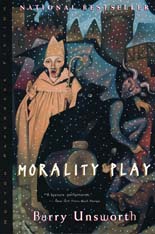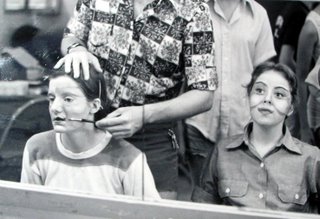I began this day at the headquarters of the Cal-Pac Conference at a design committee meeting for this year's annual conference, a drama of a very different sort. Yet, the mission is not that different from the aim of these medieval dramas. We talked about how to set the whole conference experience in the context of worship. We talked about how to convey the theme of peacemaking in word and song and motion. We talked about how to keep the theological concepts we hold dear at the center of the assembly.
To me, that doesn't seem that different from trying to create a drama to convey an appreciation for the presence of God and the role of good and evil in the life of medieval towns and people.
I drove from Pasadena to Claremont and my first stop, even before unpacking at the commuter dorm, was Mudd Theatre. I went in and sat on the steps that are central to our set and tried to prepare myself for the next four days of rehearsal and production. I tried to rid my mind of extraneous concerns or even important concerns that were not urgencies. I wanted to steep myself in the theatre and reconnect with the play and the set and my role. It had been two weeks, and I had worked hard to learn my lines over spring break, but a key missing element was the stage and the other players. So, after a time, I walked through my linde and my blocking, trying to blend movement memory with my memorized lines.
At one point, Jack came into the theatre and we talked for a time about the class and the production. It was nice to get a chance to thank him for making this opportunity possible. I told him I still had a few lines I was struggling to understand and that I had found that understanding helped markedly with both memorization and motivation. During the course of the conversation, he told me that he missed the ending line as it is written in the Chester version of Noah's Flood. The play ends somewhat ambiguously with a blessing from God that concludes: "And now farewell my darling dear." Who is darling? Is it Noah? Is it the audience? And what of goodbye? Is God leaving? Melinda and I, both admitted literalists, had talked about our discomfort with the line and had changed it to: "And now farewell, all gatehred here." A neat, tight ending that seemed to bring an unmistakable conclusion. Jack told me that he liked the ambiquity of the original line. He liked the questions it raised. He liked that it might send an audience away with questions rather than with a sense of a tidy ending. Lori Anne had told me much the same thing the last time we rehearsed.
I practiced my lines and blocking some more and marveled at how much fun it has been to get to be in a play again after more than 25 years away from any kind of theatre. Over the few weeks of rehearsal, I have been surprised at the number of times I have had a sense of getting to relive memories long past. I thought of Virginia Jessee,
my speech and drama teacher through all four years of high school. I thought of Virginia's charm bracelet. She was one of the most devout Christians I knew growing up, but she had a huge superstition when it came to our plays. She had two charm bracelets full of charms, because the tradition was that the cast of each production gave her a charm to represent their play at dress rehearsal. She always worried that maybe the latest cast wouldn't know or would forget. So for the last week of rehearsals she would wear the charm bracelets and on stage we could hear them rattling. I swear she rattled them on purpose. I sat in Mudd Theatre and realized that I missed the soung of VJ's charm bracelets. And I wished she could be present for the performance. At one point, I thought about calling the daughter I knew best to see if she could bring Mrs. Jessee out, but I don't know the current state of her health or her mobility. And, I'm embarassed to admit this, but at the point I would have invited her, I still didn't have confidence in our production. Was it going to feel like a real production or was it going to feel like a class putting on a show?

It's also hard to be in a play again and not think of my father. I think he was my biggest fan in the five years I was active in school and community theatre. When I played Emily in Our Town in high school, the final speech brought tears to my father's eyes. When I did a solo performance of Emily Dickinson in the Belle of Amherst as a drama class project my freshman year in college, I honestly think he saw me not as his daugther but as that reclusive, eccentric and prolific poet. And he had always been impressed that my last role was as the Queen in Hamlet. My father had been a journalist and then a college professor, and at some point early in my original career discernment it became clear to me that my father didn't really want me to pursue either of those professions. I was also a journalism student, and my sophmore year in college, I had to decide whether to pursue journalism or drama. I chose journalism, and I always jokingly said that I chose it because I liked to eat meals regularly and I knew I'd have a better chance at that in journalism than drama. In truth, I loved them both. Years later, when it was clear that my father was very proud of my journalism career, I asked him why he hadn't wanted me to pursue journalism or teaching. I don't remember his answer to that question, what I remember clearly is his answer to the next question I asked. "Well, if you didn't want me to be a journalist or a teacher, what did you want me to do?" With only a moment's hesitation, perhaps a hesitation in realization that he had never made this clear to me, he said: "I always hoped you would give drama a try."
My father would have loved the fact that I have found a way to do just a bit more drama, and we would have had some great conversations about my great sense of responsibility over how to portray God. He would have loved even more hearing how playing the part made me face my own thoughts and notions of not only the image of God but of how God interacts with humanity, how God interacts with me.
This night was a full night of rehearsal, a progressive rehearsal beginning with God and Noah.
I have known and respected our Noah, Paul Mitchell, from a distance since I entered CST, but this class was my first chance to get to know him. Both Paul and I have been somewhat overwhelmed learning our roles and our blocking and our on-stage interaction, that in some ways I feel I only know him as Noah or as Paul trying to become Noah. But my respect for him has only grown. He so cares about not just his part but how it is conveyed and received, just as I sense he cares about worship. Without exchanging many words at all between us, we seem to work well together to recreate this depiction of one family's experience of God.
Mrs. Noah joined us an hour later. Jeri has been one of my closest friends and classmates since we first sat together in Hebrew Bible our first semester at CST. In the come-and-go housing that is the commuter dorm, Jeri has roomed with both Melinda and me. I'm certain Jeri gave an outstanding audition, but I teased her at the time telling her she was perfect for Mrs. Noah but she was not cast based on her audtion but based on her antics that Melinda witnessed last spring in commuter housing. And Jeri
is perfect for Mrs. Noah. She is funny and feisty but also deeply caring of her friends and attentive to her relationships. I know that if she really were Mrs. Noah and the flood was a comin', she would stubbornly refuse to get on the boat if she couldn't bring me and her other dear friends along. Since I have come to see Mrs. Noah as representing all humanity, I have spent a lot of time thinking about God's motivation for saving her. Here's my conclusion: God picked Noah, but God knew all about Noah's wife when God picked Noah. If God had wanted a different kind of woman, God would have picked a different architect for the ark. God clearly values fiesty women; God clearly values those in humanity who are willing to question and to challenge. And God also values those who are open to transformation.
Noah's family joined us next. I have loved sitting atop God's ladder and watching each of these characters, each of these actors, each of these classmates. It has been fun to watch them have fun together. It has been fun to watch them grow into their parts. It has been fun to think of them as this wildly disfunctional family that God, nevertheless, has chosen to repopulate the earth! This night, we got the final blocking and concept of the sacrifice scene, and it is powerful. Because, like I said above, that which we call God, that which we call good within ourselves and one another, values all who are open to transformation.













